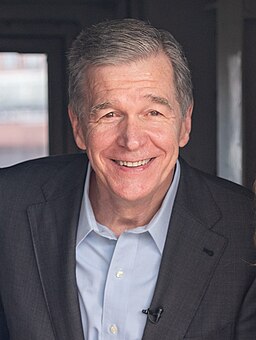North Carolina Governor Roy Cooper withdraws from consideration for Vice President Kamala Harris’s running mate, narrowing the field of candidates
North Carolina Governor Roy Cooper has officially withdrawn from the race to become Vice President Kamala Harris’s running mate, leaving the VP selection process with fewer prominent contenders. Cooper, who had been a leading candidate for the vice-presidential slot, confirmed his decision via social media on Monday night.
In his statement, Cooper expressed that it was not the right time for him or North Carolina to pursue a national ticket. He acknowledged the pool of candidates Harris has to choose from and assured his support for her campaign. “This just wasn’t the right time for North Carolina and for me to potentially be on a national ticket,” Cooper wrote. “She has an outstanding list of people from which to choose, and we’ll all work to make sure she wins.”
Embed from Getty ImagesCooper’s decision follows a request from Harris’s campaign last week for him to be vetted for the vice-presidential position. Despite being asked to undergo the vetting process, Cooper opted out, citing concerns over the potential legal challenges from his successor, Lt. Gov. Mark Robinson. Robinson, a conservative Republican, could have posed legal obstacles to Cooper’s authority if he were to be out of state. Cooper, who is barred from seeking a third term, believed that such challenges would create unnecessary distractions during the campaign.
The Harris campaign has not commented on Cooper’s withdrawal. Cooper and Harris have a history of collaboration dating back to their tenures as state attorneys general, and he recently campaigned alongside her. As Governor, Cooper has been a key Democratic figure in North Carolina, a crucial battleground state where he has won two gubernatorial races despite losing the state in presidential elections.
With Cooper out of the running, Harris’s campaign must now make a final decision from the remaining top candidates. These include Pennsylvania Governor Josh Shapiro, Minnesota Governor Tim Walz, Kentucky Governor Andy Beshear, Arizona Senator Mark Kelly, and Transportation Secretary Pete Buttigieg. All are recognized for their electoral successes and political influence in their respective states.
The field of contenders for the vice-presidential nomination is now predominantly comprised of white men, with the exception of Buttigieg. Shapiro, Walz, Beshear, and Kelly all have significant electoral achievements, with Shapiro and Beshear having won in states that leaned Republican in presidential elections. Buttigieg, a former presidential candidate and current cabinet member, remains a notable figure in the race.
The Harris campaign has been working under a tight timeline, aiming to finalize the vice-presidential pick by August 7, shortly after Harris officially entered the race to succeed President Biden. The vetting process began last week and has involved interviews with potential candidates, though none have yet met Harris in person. The campaign’s scrutiny continues as contenders actively campaign and engage with the media, further positioning themselves as viable choices for the vice-presidential slot.
Analysis
Political
Governor Roy Cooper’s withdrawal from the vice-presidential race reflects a strategic move to avoid potential political turbulence. His exit narrows down the pool of candidates for Kamala Harris, who is working against a tight deadline to finalize her running mate. Cooper’s decision underscores the complexities of selecting a vice-presidential candidate, where political stability and the ability to navigate potential challenges are crucial. His departure leaves the campaign to focus on other prominent figures, each of whom brings distinct political strengths and electoral success to the table. The remaining candidates, all with substantial experience and achievements, highlight the campaign’s need to balance electoral strategy with the broader appeal of the ticket.
Social
Socially, Cooper’s withdrawal highlights the dynamic nature of vice-presidential selection, reflecting the intense scrutiny and strategic considerations involved. His decision resonates with broader societal themes of political responsibility and leadership. As the Democratic Party seeks to present a united and effective ticket, the process underscores the importance of choosing a candidate who can contribute to both the electoral success and governance of the administration. Cooper’s exit also emphasizes the role of personal and political timing in high-stakes decisions, reflecting the broader societal expectations of political figures balancing personal ambitions with public responsibilities.
Racial
The racial dynamics of the vice-presidential selection process remain a point of consideration. With Cooper’s exit, the remaining prominent candidates are predominantly white men, which contrasts with the diverse backgrounds often highlighted in modern political campaigns. While Cooper’s departure may influence the racial composition of the ticket, the campaign’s choice will continue to be scrutinized for its impact on diversity and representation. The ongoing discussion around vice-presidential candidates reflects the broader societal debate on the representation and inclusion of diverse voices in high-level political roles.
Gender
Gender considerations play a significant role in the vice-presidential selection process. Kamala Harris, as the first female Vice President, has set a precedent for gender diversity in the upper echelons of U.S. politics. The remaining candidates, all male, highlight the need for the campaign to consider how gender diversity can influence the overall ticket appeal. Harris’s selection of a running mate will be closely examined for its impact on gender representation and its ability to address the expectations of voters seeking a diverse and inclusive leadership team.
Economic
Economically, the choice of a vice-presidential candidate can have implications for campaign fundraising and voter support. Cooper’s withdrawal shifts the focus to other candidates who have demonstrated economic acumen and political success in various states. The selection of a running mate will be strategic in bolstering the ticket’s appeal to key demographic and geographic areas, potentially influencing campaign donations and support. The economic impact of the vice-presidential pick extends to how effectively the campaign can mobilize resources and engage with voters in pivotal regions.
